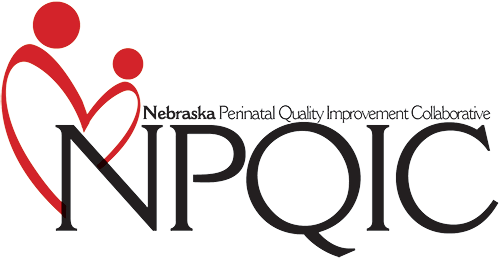Culturally Matched Doula Support
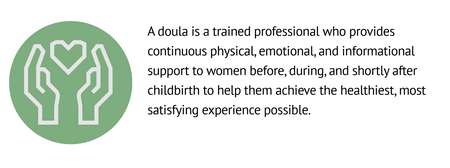
This infographic is a publication of the National Academy for State Health Policy (NASHP). July, 2020.
https://www.nashp.org/wp-content/uploads/2020/07/doula-infographic-new-1.pdf
In Nebraska and throughout the U.S., Black, Indigenous, and People of Color (BIPOC) have a disproportionally high burden of adverse perinatal outcomes compared to non-Hispanic white and Hispanic birthing people. Integrating doula support into the perinatal care of birthing people has been shown to decrease rates of medical intervention and anesthesia at birth, reduce cesarean section rates, and increase breastfeeding initiation rates. As patient advocates, doulas provide critical support, especially to those at risk of bias and discrimination.
NPQIC collaborated with I Be Black Girl and A Mother's Love to provide culturally-matched doulas for high-risk BIPOC birthing people, with financial support from United Healthcare. The aim was to improve communication with the medical team, decrease the use of unnecessary medical interventions, and reduce the impact of social determinants of health. Currently, doula services ($1,000-$2,000 per birth) are not covered by state insurance, and only some private insurance plans will cover this cost.
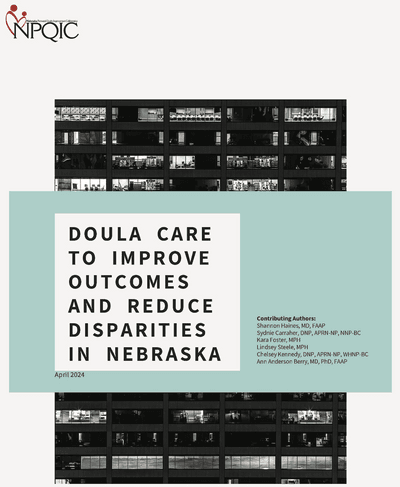
Update: NPQIC White Paper: Doula Care to Improve Outcomes and Reduce Disparities in Nebraska (April 2024)
The White Paper highlights:
-
The alarming racial disparities in maternal and infant morbidity and mortality that exist in the U.S. and Nebraska, including the significant contributing factors and economic burden.
-
Potential solutions including the provision of doula care (with a focus on culturally congruent doulas for Black, Indigenous, and People of Color (BIPOC) communities), implicit bias training for providers, improved access to prenatal care, and addressing social determinants of health through policy changes.
-
Establishing Medicaid reimbursement for doula services in Nebraska is proposed as a key intervention involving a doula-led workgroup to develop implementation guidelines, training, credentialing, and quality assurance measures.
-
The need for collaborative, multifaceted, and community-driven efforts involving doulas and affected communities is crucial to implement meaningful, holistic changes and ultimately improve maternal and infant health outcomes while ending racial disparities.
We encourage you to review the White Paper to understand Nebraska's maternal health landscape better and, most importantly, identify opportunities for policy, systems, and environmental changes that could significantly improve outcomes for ALL Nebraska mothers, babies, and their families.
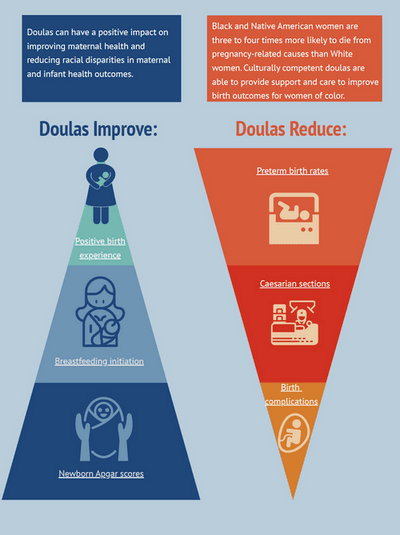
This infographic is a publication of the National Academy for State Health Policy (NASHP). July, 2020.
https://www.nashp.org/wp-content/uploads/2020/07/doula-infographic-new-1.pdf
Project Resources
March of Dimes Position Statement on Doulas and Birth Outcomes, (3/2022)
ACOG Committee Opinion #766: Approaches to Limit Intervention During Labor and Birth, (2019)
Doulas, Racism, and Whiteness: How Birth Support Workers Process Advocacy towards Women of Color, (2022)
Cochrane Review: Continuous Support for Women During Childbirth. (2017)
Doula Friendly Practices
New 2025 NPQIC Brief: Rooted Doula Care and Support Program
NPQIC Brief: Findings from Focus Groups with Black Doulas
NPQIC Brief: Findings from the Nebraska Provider Survey
CMQCC: Strategies for Doula Implementation, (2022)
New York Coalition for Doula Access: Principles of a Doula-Friendly Hospital
Community Partners
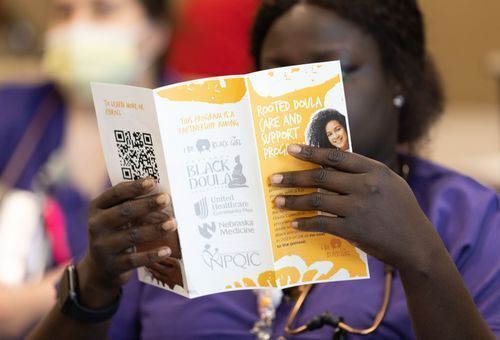
Rooted Doula Care and Support Meet and Greet
